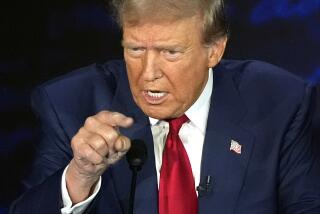Immigration a hot topic in Whitman and Poizner’s last debate
Reporting from San Jose — Debating for the final time before next month’s primary election, GOP gubernatorial candidates Meg Whitman and Steve Poizner on Sunday engaged in a lively and personal joust, attacking each other’s business dealings, political affiliations and consistency on policy issues.
Much of the event consisted of thrusts and parries, with front-runner Whitman defending herself against Poizner’s attacks and launching several of her own as the pair addressed topics including immigration, the environment and California’s public pension system. Few sharp policy differences emerged amid the accusations of poor character that were a departure from the general gentility of their one previous debate.
Early in the hourlong faceoff before an audience of supporters and Silicon Valley business leaders at San Jose’s Tech Museum, Poizner seized on Whitman’s connections to the embattled Wall Street firm Goldman Sachs. She once sat on its board, and she profited from a controversial stock deal with the firm that later came under congressional scrutiny.
“Meg Whitman has massive investments in Goldman Sachs, made huge amounts from the collapse of the housing market and, when it was time for Goldman Sachs to get bailed out by taxpayers, Meg Whitman campaigned” for the rescue, said Poizner, who is California’s insurance commissioner.
Answering a panelist’s question about the stock deal, Whitman, the billionaire former CEO of EBay, said, “I did not do anything wrong. With 20-20 hindsight, would I do it again? No, because it was called into question.”
Said Poizner: “Wow, you really don’t get this, Meg.... Until you got caught, you didn’t think anything was wrong. Congress investigated what you did. They called it ‘corrupt.’ ”
Whitman accused Poizner, who is seeking to position himself as the more conservative of the two, with changing his policy positions for political expedience. Poizner commented that he now supports new legislation cracking down on illegal immigrants in Arizona — legislation he said he opposed until revisions were made in recent days — and Whitman called his endorsement “a classic case of Steve Poizner changing his mind.”
“Since he ran for Assembly in 2004, he has changed his position on every important thing,” said Whitman, who opposes the new Arizona law.
Poizner said the tweaks to the law “have taken care, from my point of view, of any concerns.... It is about time we have people running for office who have the guts to talk about the honest truth here.... We are bankrupt. We are out of cash and we need to take some steps to stop the flow of people who are here illegally.”
Poizner said he would “send the National Guard to the border if that is what I have to do.”
Whitman denied Poizner’s claim that she supports amnesty for illegal immigrants and vowed tough action if elected. She said immigration reform is in order over the long term, but first the border must be secured and other measures taken to reduce the number of illegal arrivals.
“We have got to get control of the illegal immigration problem,” she said. “I will build an economic fence to keep employers from hiring illegal aliens, and I will make sure that we eliminate sanctuary cities” — a move Poizner also espoused.
Both candidates also expressed support for the tea party movement that has galvanized opponents of illegal immigration and anti-tax activists.
The debate, sponsored by the Silicon Valley Leadership, Comcast and other broadcasting companies, came as Whitman enjoys a strong lead in the polls. A Los Angeles Times/USC survey released early last month showed her 40 points ahead, although she has been losing ground to Poizner in recent weeks.
As the exchange continued, both candidates expressed disdain for the recent federal healthcare overhaul, saying it threatens to cost California billions of dollars and criticizing it as a major intrusion by the federal government. And both called for significant changes in the pension system for government workers: rolling back generous benefits and adopting a system that more closely resembles what is available to the average worker for a private company.
On education, Whitman said California had sufficient money. “The problem is how this money is spent,” she said. “The educrats in Sacramento are telling our school districts how to buy blackboards.... I’m in favor of grading every single school A to F.... We’ve got to find the great teachers and we’ve got to pay them more.”
Poizner said he would “rip control” of public schools from Sacramento. “As governor, I am going to give all public schools in California the same kind of freedom and flexibility that charter schools have.”
Both also urged a rollback of California’s landmark anti-global-warming legislation. Asked if they believed global warming was caused by humans, each said science had not yet determined that and that implementing the law as planned would cause economic chaos.
Poizner said the measure could actually harm the environment, pushing more firms to locate in the Midwest, where the cost of business is cheaper but energy needs are more likely to be met with coal power, which produces more pollution.
Whitman said new regulations to limit greenhouse gases would place a hardship on businesses and cost jobs, something the state cannot afford.
In the competition for conservative credentials, each candidate demanded that the other explain past support for Democratic politicians — raised in both their advertising campaigns — and accused each other of having ties to the same Democrat, former Vice President Al Gore.
Poizner said Whitman had endorsed Gore, which Whitman denied. She pointed to Poizner’s large political contribution to the former vice president. In the past Poizner has said that the check was from his wife and that he backed Bush.
Whitman explained her past support for Democratic U.S. Sen. Barbara Boxer as a business decision: “She was against new taxes on the Internet. I joined her to join with a group of executives on that one issue.”
And both sought to distance themselves from Gov. Arnold Schwarzenegger, a moderate fellow Republican whose popularity in his party has long been on the wane.
“Steve Poizner called himself an Arnold Schwarzenegger Republican when he ran for insurance commissioner,” Whitman said. “Now that Gov. Arnold Schwarzenegger is not so popular anymore, he is absolutely running the other direction.”
Poizner lobbed back, “I am not like Gov. Schwarzenegger or most people who have run for office.... I have the character and tenacity and backbone to get done what I say I am going to get done.”
More to Read
Get the L.A. Times Politics newsletter
Deeply reported insights into legislation, politics and policy from Sacramento, Washington and beyond. In your inbox three times per week.
You may occasionally receive promotional content from the Los Angeles Times.











